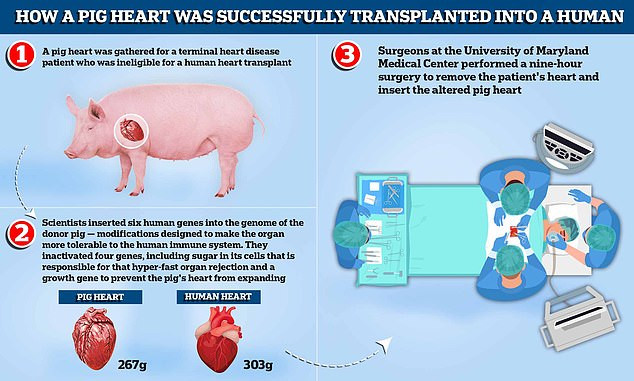David Bennett, 57, the first man to receive a transplant of a genetically altered pig heart has died two months after the successful transplant.
Bennett from Hagerstown Maryland, died Tuesday, March 8, at the University of Maryland Medical Center.
The cause of death was not revealed but doctors from the Maryland hospital that carried out the surgery told reporters on Wednesday, March 9, that his condition had deteriorated over the past several days.
Bennet received a groundbreaking transplant where the pig’s heart was genetically modified in a way that would prevent a human body from rejecting it.
Before the transplant, the man was already in a desperate condition but did not meet criteria to receive a normal, human heart transplant.

Bennett’s son praised the hospital for offering the last-ditch experiment, saying the family hoped it would help further efforts to end the organ shortage.
‘We are grateful for every innovative moment, every crazy dream, every sleepless night that went into this historic effort,’ David Bennett Jr. said in a statement.
‘We hope this story can be the beginning of hope and not the end,’ he said. ‘We pray that those looking for hope will continue to fight for the future, fight for new ideas, fight for answers, fight for life. Fight like Dave.’

The doctors who worked with Bennett praised the 57-year-old for his bravery.
‘We are devastated by the loss of Mr. Bennett. He proved to be a brave and noble patient who fought all the way to the end. We extend our sincerest condolences to his family,’ Dr. Bartley Griffith, the surgeon who led Bennett’s transplant said in a statement. ‘Mr. Bennett became known by millions of people around the world for his courage and steadfast will to live.’
Dr. Muhammad Mohiuddin, director of cardiac xenotransplantation at the University of Maryland Medical Center, said Bennett’s successful transplant has provided great insight for future procedures.
‘We have gained invaluable insights learning that the genetically modified pig heart can function well within the human body while the immune system is adequately suppressed,’ he said in a statement.
‘We remain optimistic and plan on continuing our work in future clinical trials,’ he added.
Scientists inserted six human genes into the genome of the donor pig – modifications designed to make the organ more tolerable to the human immune system.
The scientists activated four genes, including sugar in its cells that is responsible for that hyper-fast organ rejection and a growth gene to prevent the pig’s heart, which weighs around 267g compared to the average human heart which weighs 303g, from continuing to expand.
Prior attempts at such transplants also known as xenotransplantation – have failed largely because patients’ bodies rapidly rejected the animal organ.



